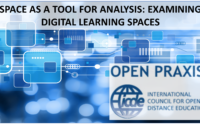
What factors promote student resilience on a level 1 distance learning module?
Resilience is understood to be the ability to adapt positively in the face of adversity. In relation to new students on a distance learning module, this can mean how they adapt and make sense of the demands of their chosen study to enable them to persist in their studies. This article reports a small-scale study […]















